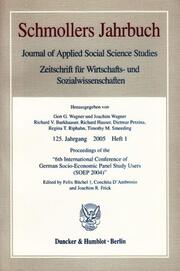Detailansicht
Proceedings of the '6th International Conference of German Socio-Economic Panel Study Users (SOEP 2004)'.
Schmollers Jahrbuch, 125. Jg. (2005), Heft 1., Schmollers Jahrbuch. Journal of Contextual Economics
ISBN/EAN: 9783428118809
Umbreit-Nr.: 3531222
Sprache:
Englisch
Umfang: VI, 205 S., Tab., Abb.
Format in cm:
Einband:
kartoniertes Buch
Erschienen am 17.05.2005
Auflage: 1/2005
- Zusatztext
- The papers in this special issue of Schmollers Jahrbuch are a selection of those presented at the Sixth International Conference of German Socio-Economic Panel Study Users (SOEP 2004), held in Berlin from June 24 to June 26, 2004, in conjunction with the Second International Conference of Users of the European Community Household Panel (EPUNet 2004). Not only do these papers illustrate the multidisciplinarity of SOEP data users; they also give evidence of the global spread of SOEP, with presenters coming from Australia, North America and throughout Europe. At the same time, the conference papers reflect an increasing interest in methodological research as well as cross-national comparisons. German reunification, and the concomitant transition from a socialist to a market driven economy, has always been a subject of great interest for diverse analyses, and SOEP data offers a unique source of information on this process. Two papers in this special issue investigate its effect an the labor market. Gathmann provides estimates of the relative wage loss of older workers during this transition, and shows that older workers lose up to 30% of their earnings through the depreciation of socialist work experience. Anger, an the other hand, focuses on the differences between East and West Germany in unpaid overtime, which is strikingly high in the East. She finds partial evidence that workers use overtime to signal higher productivity in order to reduce the risk of losing their jobs.
- Autorenportrait
- InhaltsangabeInhalt: Introduction - Felix Büchel Award - C. Gathmann, The Skill Loss of Older East Germans after Unification - S. Anger, Unpaid Overtime in Germany: Differences between East and West - H. J. Baumgartner / V. Steiner, Student Aid, Repayment Obligations and Enrolment in Higher Education in Germany. Evidence from a "Natural Experiment" - P. Haan / V. Steiner, Distributional Effects of the German Tax Reform 2000. A Behavioral Microsimulation Analysis - H. Schneider / A. Uhlendorff, Transitions from Welfare to Employment: Does the Ratio between Labor Income and Social Assistance Matter? - B. Rabe, The Role of Firm Pensions for Job Change in Germany - A. Mertens / F. McGinnity, A "Two-Tier" Labour Market for Fixed-Term Jobs? Evaluating Evidence from West Germany Using Quantile Regression - I. Geishecker, International Outsourcing and German Manufacturing Wages - C. Fagan / B. Halpin / J. O'Reilly, Service Sector Employment in Germany and the UK - D. R. Lillard / R. V. Burkhauser, Income Inequality and Health: A Cross-Country Analysis - J. Cawley / M. M. Grabka / D. R. Lillard, A Comparison of the Relationship Between Obesity and Earnings in the U.S. and Germany - B. Headey / R. Muffels / M. Wooden, Money and Happiness: The Combined Effects of Wealth, Income and Consumption - M. Kreyenfeld / C. Zabel, Female Education and the Second Child: Great Britain and Western Germany Compared - H. Jürges, Retrospective Error in SOEP Calendar Data: The Case of Unemployment - E. Basic / I. Marek / U. Rendtel, The German Microcensus as a Tool for Longitudinal Data Analysis: An Evaluation Using SOEP Data - C. Schäfer / J.-P. Schräpler / K.-R. Müller / G. G. Wagner, Automatic Identification of Faked and Fraudulent Interviews in the German SOEP - O. Serfling, The Interaction between Item, Questionnaire and Unit Nonresponse in the German SOEP
